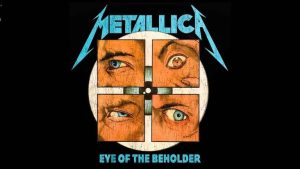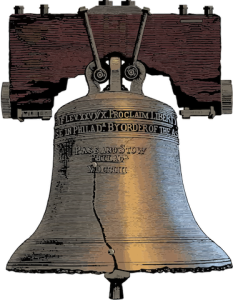The Ring of Freedom
Prior to becoming a household name with the song Enter Sandman, Metallica recorded an album in 1988 called . . .And Justice For All. In many ways, this was a transition recording for the group, their first with bassist Jason Newsted, as they were evolving from their thrash origins to a more developed musical sound (despite the album’s inexplicably terrible mixing). Like many of their earliest works, this was a concept album, which in this case highlighted various ways in which power can be abused.
The track listing includes Eye Of The Beholder, which is a great example, and one of my own favorites. It explores how dishonest freedom can be reduced to simply a means of public manipulation. (As one of its best lines states: “You can do it your own way — if it’s done just how I say”.) The lyrics cleverly outline how some people who speak of freedom do so with implied exceptions, and drives home just how misused and misdirected freedom can one day become the means of our own enslavement.
 Since the founding of our nation at the very peak of the 18th Century Enlightenment, we TGForum readers in the United States have often had an uneasy relationship between liberty and freedom. These are two different words with two distinct meanings, reflected in their etymological origins. The word “liberty” has come to us from the Romans. To them, libertas meant the freedom that comes from leading an orderly interior and exterior life, which permits one to govern herself (and, by extension, others) well. The scope, adaptability and durability of Roman civilization over many centuries, lands and cultures testifies to this concept.
Since the founding of our nation at the very peak of the 18th Century Enlightenment, we TGForum readers in the United States have often had an uneasy relationship between liberty and freedom. These are two different words with two distinct meanings, reflected in their etymological origins. The word “liberty” has come to us from the Romans. To them, libertas meant the freedom that comes from leading an orderly interior and exterior life, which permits one to govern herself (and, by extension, others) well. The scope, adaptability and durability of Roman civilization over many centuries, lands and cultures testifies to this concept.
In contrast, “freedom” derives from the German word frei. At its best, this means the ability to live an honest and productive life, working openly with others in a spirit of mutual support and collaboration. But at its worst — harkening back to the anarchic origins of the German tribes, which include the forebears of the English-speaking peoples — this can selfishly mean “freedom for me, at your expense”. Sadly, a cursory study of German history is rife with periodic examples of this mentality on full, dark display.
After all, if freedom simply means doing whatever I want, then others can do whatever they want to me. Using and abusing others, scheming for power and control, and treating people as simply the means to an end, is the logical consequence. This is one reason why, at times in the American experience, we have failed to recognize the full humanity of certain groups of human beings — as indeed we still do today. This week we justly commemorate significant examples of this.
Readers of this article have doubtless experienced such struggles within a TG context. We can thankfully take for granted that we live in free societies, with reasonably well-ordered political liberty, and fellow citizens of good will. Despite personal and public challenges, we can all remember times in our lives when living openly in such manner would have required greater cost, risk and sacrifice than it does today.
Even so, we have probably often asked ourselves: What does freedom really mean? For some of us, this involves legal recognition and public acknowledgement of our state in life. For others, this means more of the personal variety — including the freedom to work, worship, socialize, study, and travel openly without harassment, all as relevant today as ever. Some interpret this to mean they can do whatever they want, wherever they please, and everyone just has to go along with it or else. But no matter how this is understood, one must face and accept the consequences of one’s actions.
I believe I have always placed a great value on both liberty and freedom. But my personal priorities have admittedly evolved over time, based on my state in life. Looking back to my childhood, I can only wonder how things might have turned out differently for me had such safe outlets existed then, where if not encouraged I might at least have experienced support. To the extent that I ever dwelled on it, freedom to me then would have meant possibly having some pretty clothes to wear at times, or beautiful items to furnish my room.
Moving into adolescence, my understanding of freedom was typically entitled and undisciplined, along the lines of “I’ll do whatever I want, now leave me alone” — the mentality of income without work, or indulging in illicit passions without unhealthy results. Predictably, my desires were self-centered and materialistic: Plenty of clothes and makeup, time left alone to experiment, and some girlfriends who might have assisted me. (Maybe I could even have attended my senior prom in a beautiful gown!)
 As I entered adulthood and began paying my way through life, with my own apartment, I finally had the resources and the freedom to live as I liked. In these years, I amassed a good-sized wardrobe, and freely dressed behind closed doors. But eventually, I realized that a truly free life was not meant to be lived privately, isolating myself from the larger communities — personal and professional — in which I lived. I have since integrated myself fully into public life. And at least partly as a result, I no longer consider freedom as simply a means of acquiring endless and ultimately unfulfilling material largesse, as much as living well and happily in daily circumstances. It seems to me that the ability to be productive and personable at work, engage successfully with friends and neighbors, and serve as an example or inspiration where possible, is what freedom in this context is all about.
As I entered adulthood and began paying my way through life, with my own apartment, I finally had the resources and the freedom to live as I liked. In these years, I amassed a good-sized wardrobe, and freely dressed behind closed doors. But eventually, I realized that a truly free life was not meant to be lived privately, isolating myself from the larger communities — personal and professional — in which I lived. I have since integrated myself fully into public life. And at least partly as a result, I no longer consider freedom as simply a means of acquiring endless and ultimately unfulfilling material largesse, as much as living well and happily in daily circumstances. It seems to me that the ability to be productive and personable at work, engage successfully with friends and neighbors, and serve as an example or inspiration where possible, is what freedom in this context is all about.
 I am not an activist – political, social or otherwise. (In fact, I do my best to abstain from politics, for reasons that become clearer every day.) However, since others will succeed me wherever I go, I am obliged to set a good public image. If I come across as a narcissistic extremist, or as an overgrown teenager, then nothing productive is likely to follow. But if I am approachable, dignified and even able to laugh at myself on occasion, it will have a disarming effect. To paraphrase Dr. King, we should aspire to be judged not by the style of our clothes, but by the content of our character.
I am not an activist – political, social or otherwise. (In fact, I do my best to abstain from politics, for reasons that become clearer every day.) However, since others will succeed me wherever I go, I am obliged to set a good public image. If I come across as a narcissistic extremist, or as an overgrown teenager, then nothing productive is likely to follow. But if I am approachable, dignified and even able to laugh at myself on occasion, it will have a disarming effect. To paraphrase Dr. King, we should aspire to be judged not by the style of our clothes, but by the content of our character.
Consider the example of the 1960s civil rights movement; it was one thing to support political equality for Black Americans in the abstract, but another thing to personally support them as individuals in your home, workplace, neighborhood, etc. Once those barriers were broken, genuine social integration followed.
 This year, let authentic freedom ring in your private and public life. Live freely, honestly, simply and well. Life, liberty and the pursuit of true happiness are always worth your time, effort and sacrifice. You never know who you might influence along the way!
This year, let authentic freedom ring in your private and public life. Live freely, honestly, simply and well. Life, liberty and the pursuit of true happiness are always worth your time, effort and sacrifice. You never know who you might influence along the way!
Like to make a comment? Login here and use the comment area below.
Category: Transgender Opinion





